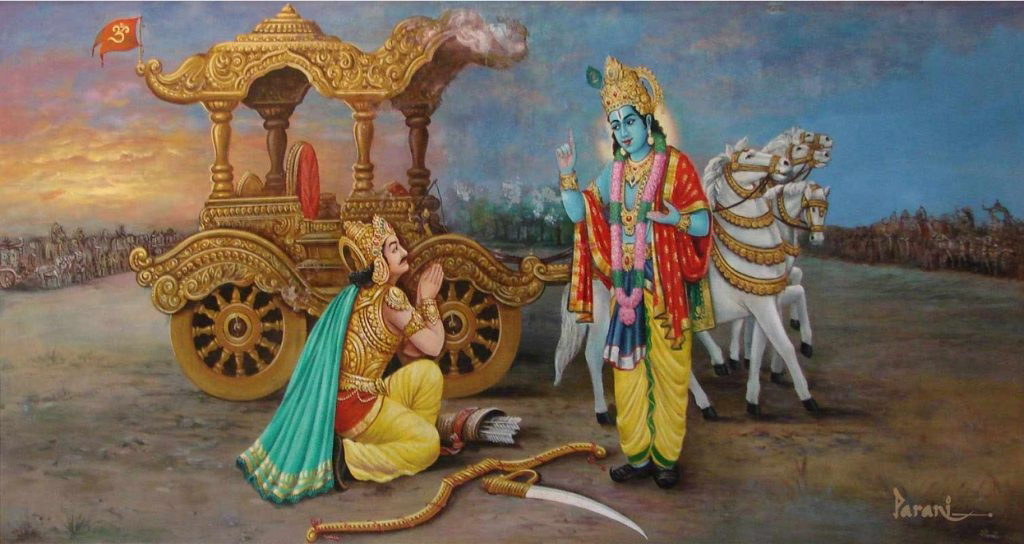The Bhagavad Gita | Chapter 16 : Divine Traits and Demonic Traits
अथ षोडशोஉध्यायः ।
श्रीभगवानुवाच ।
अभयं सत्त्वसंशुद्धिर्ज्ञानयोगव्यवस्थितिः ।
दानं दमश्च यज्ञश्च स्वाध्यायस्तप आर्जवम् ॥ 1 ॥
अहिंसा सत्यमक्रोधस्त्यागः शान्तिरपैशुनम् ।
दया भूतेष्वलोलुप्त्वं मार्दवं ह्रीरचापलम् ॥ 2 ॥
तेजः क्षमा धृतिः शौचमद्रोहो नातिमानिता ।
भवन्ति सम्पदं दैवीमभिजातस्य भारत ॥ 3 ॥
दम्भो दर्पोஉभिमानश्च क्रोधः पारुष्यमेव च ।
अज्ञानं चाभिजातस्य पार्थ सम्पदमासुरीम् ॥ 4 ॥
दैवी सम्पद्विमोक्षाय निबन्धायासुरी मता ।
मा शुचः सम्पदं दैवीमभिजातोஉसि पाण्डव ॥ 5 ॥
द्वौ भूतसर्गौ लोकेஉस्मिन्दैव आसुर एव च ।
दैवो विस्तरशः प्रोक्त आसुरं पार्थ मे शृणु ॥ 6 ॥
प्रवृत्तिं च निवृत्तिं च जना न विदुरासुराः ।
न शौचं नापि चाचारो न सत्यं तेषु विद्यते ॥ 7 ॥
असत्यमप्रतिष्ठं ते जगदाहुरनीश्वरम् ।
अपरस्परसम्भूतं किमन्यत्कामहैतुकम् ॥ 8 ॥
एतां दृष्टिमवष्टभ्य नष्टात्मानोஉल्पबुद्धयः ।
प्रभवन्त्युग्रकर्माणः क्षयाय जगतोஉहिताः ॥ 9 ॥
काममाश्रित्य दुष्पूरं दम्भमानमदान्विताः ।
मोहाद्गृहीत्वासद्ग्राहान्प्रवर्तन्तेஉशुचिव्रताः ॥ 10 ॥
चिन्तामपरिमेयां च प्रलयान्तामुपाश्रिताः ।
कामोपभोगपरमा एतावदिति निश्चिताः ॥ 11 ॥
आशापाशशतैर्बद्धाः कामक्रोधपरायणाः ।
ईहन्ते कामभोगार्थमन्यायेनार्थसञ्चयान् ॥ 12 ॥
इदमद्य मया लब्धमिमं प्राप्स्ये मनोरथम् ।
इदमस्तीदमपि मे भविष्यति पुनर्धनम् ॥ 13 ॥
असौ मया हतः शत्रुर्हनिष्ये चापरानपि ।
ईश्वरोஉहमहं भोगी सिद्धोஉहं बलवान्सुखी ॥ 14 ॥
आढ्योஉभिजनवानस्मि कोஉन्योस्ति सदृशो मया ।
यक्ष्ये दास्यामि मोदिष्य इत्यज्ञानविमोहिताः ॥ 15 ॥
अनेकचित्तविभ्रान्ता मोहजालसमावृताः ।
प्रसक्ताः कामभोगेषु पतन्ति नरकेஉशुचौ ॥ 16 ॥
आत्मसम्भाविताः स्तब्धा धनमानमदान्विताः ।
यजन्ते नामयज्ञैस्ते दम्भेनाविधिपूर्वकम् ॥ 17 ॥
अहङ्कारं बलं दर्पं कामं क्रोधं च संश्रिताः ।
मामात्मपरदेहेषु प्रद्विषन्तोஉभ्यसूयकाः ॥ 18 ॥
तानहं द्विषतः क्रूरान्संसारेषु नराधमान् ।
क्षिपाम्यजस्रमशुभानासुरीष्वेव योनिषु ॥ 19 ॥
आसुरीं योनिमापन्ना मूढा जन्मनि जन्मनि ।
मामप्राप्यैव कौन्तेय ततो यान्त्यधमां गतिम् ॥ 20 ॥
त्रिविधं नरकस्येदं द्वारं नाशनमात्मनः ।
कामः क्रोधस्तथा लोभस्तस्मादेतत्त्रयं त्यजेत् ॥ 21 ॥
एतैर्विमुक्तः कौन्तेय तमोद्वारैस्त्रिभिर्नरः ।
आचरत्यात्मनः श्रेयस्ततो याति परां गतिम् ॥ 22 ॥
यः शास्त्रविधिमुत्सृज्य वर्तते कामकारतः ।
न स सिद्धिमवाप्नोति न सुखं न परां गतिम् ॥ 23 ॥
तस्माच्छास्त्रं प्रमाणं ते कार्याकार्यव्यवस्थितौ ।
ज्ञात्वा शास्त्रविधानोक्तं कर्म कर्तुमिहार्हसि ॥ 24 ॥
ॐ तत्सदिति श्रीमद्भगवद्गीतासूपनिषत्सु ब्रह्मविद्यायां योगशास्त्रे श्रीकृष्णार्जुनसंवादे
दैवासुरसम्पद्विभागयोगो नाम षोडशोஉध्यायः ॥16 ॥
Summary
Krishna describes the characteristics that belong to wise men versus "men with demonic traits." The divine traits are those of the enlightened person or the person with the potential to become a sage. These traits include purity of heart, integrity, compassion, courage, and a loving heart. Krishna considers the traits of ignorance, hypocrisy, anger, and conceit demonic qualities. According to Krishna, Arjuna has the divine traits. Krishna explains that a man born with demonic traits may think "the universe has no moral / order, no truth, no God." These people enter hell by allowing themselves to be controlled by their endless desires. These men are reborn again and again into "demonic wombs" and become trapped in hell as a result.
Analysis
Krishna gives Arjuna another framework for understanding the difference between people with the potential for achieving true wisdom and those reborn many times into lives with suffering. Krishna describes as "divine" the character traits necessary for a person to come to understand the nature of God and the Self. The traits that keep individuals attached to their senses and their bodies are "demonic" traits. People ruled by demonic traits move from one lustful or sensory experience to the next, never satisfied or aware of the true nature of God or existence. Those with demonic traits often lack belief in God or in any order to the universe.
Interestingly, Krishna actually says that he keeps causing people to be reborn into "demonic wombs" as compensation for being controlled by their desires. He adds they are "deluded in birth after birth." They "never reach [God] / but sink to the lowest state." These lines often puzzle readers. Krishna seems to be saying he purposefully causes certain people to be born into "demonic" incarnations again and again. These unfortunates are without the hope of attaining release from the cycle or of union with God. The contradiction is this: if people are born only into "demonic" incarnations, they can never gain the "divine" qualities needed to move upward. This situation could seem like an endless trap that relegates some people into a permanent hell and thus seems inconsistent with Krishna's teachings in the Gita thus far: that most beings at some point are able to rise from the depths to move toward better incarnations and toward God.
application part in human affairs
Chapter 16 of the Bhagavad Gita, delineating divine and demonic traits, imparts profound wisdom on the importance of virtues in shaping human life. It serves as a timeless guide for individuals navigating the complexities of their own character and moral choices.
The chapter underscores the significance of cultivating divine traits such as purity of heart, integrity, compassion, courage, and a loving disposition. These virtues are not merely ethical standards but keys to unlocking a deeper understanding of God and the Self. By embodying these qualities, individuals pave the way for spiritual growth and enlightenment.
Conversely, the identification of demonic traits—ignorance, hypocrisy, anger, and conceit—highlights the pitfalls that hinder one's spiritual progress. The Gita warns against succumbing to desires without moral order, emphasizing the karmic consequences of such choices. The cyclical rebirth into "demonic wombs" signifies the perpetual cycle of suffering for those who remain trapped in sensory indulgence and material pursuits.
The teaching offers a practical framework for self-reflection, encouraging individuals to assess and refine their character traits. It serves as a moral compass, guiding them towards a life that aligns with higher principles and a deeper understanding of the divine order. The Gita's wisdom is not confined to a particular time or culture; it resonates universally, providing individuals with timeless guidance on the path to self-realization and spiritual fulfillment in the journey of human life.
कृष्णम् वन्दे जगद्गुरुम्🙏



Comments
Post a Comment